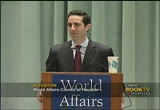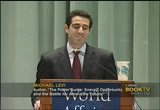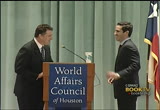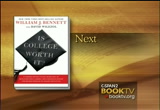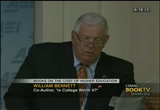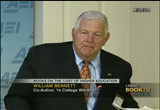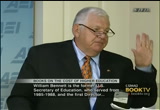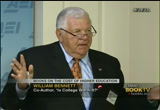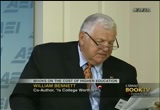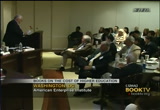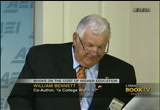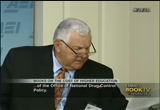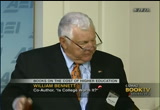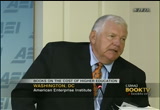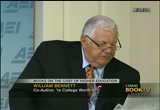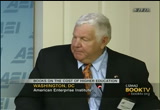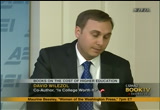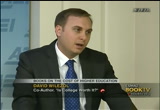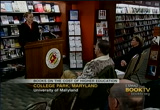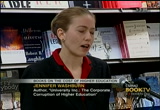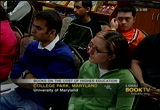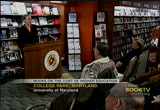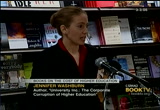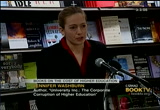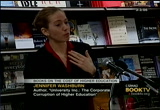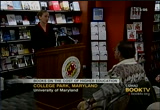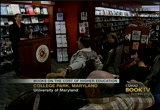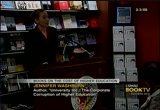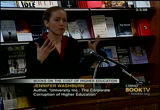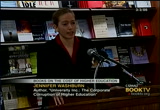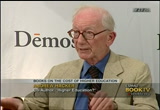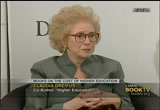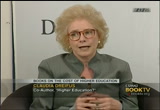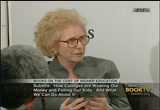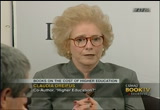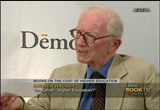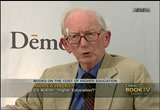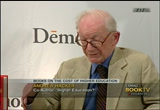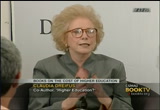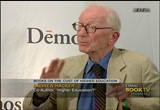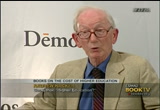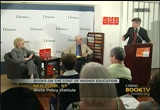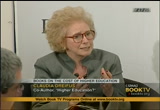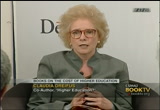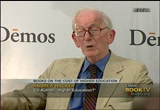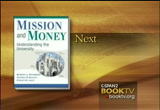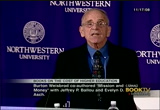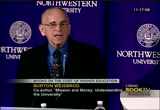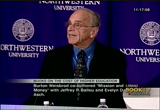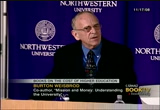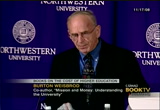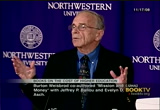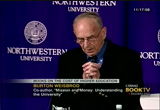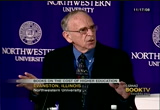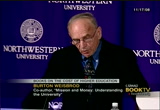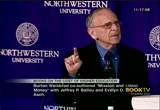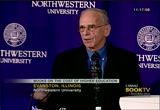tv Book TV CSPAN August 11, 2013 6:00pm-7:01pm EDT
6:00 pm
and i looked around a bit nervously and i said you've caught me at the airport. [laughter] maybe we will have this conversation another time. so we even chile had the conversation, not at the airport. some of the nsa recent advances apparently haven't been put in place at the time. they called and they said okay.
6:01 pm
ocean, desert and i said definitely ocean. desert will kick up radioactive dust and pose a danger to the community. they said fantastic. they called me back a week or two later and said we looked into it. it's too expensive to fill the test so we have to crash the plane in the desert. can you come up with a reason that we shouldn't put it in the ocean? and decide what about making sure we don't harm fish? i said what about saying they're visiting the area and this would cause an international integration? are the with the fish? [laughter] the lesson you should take from this is television advisers, and dramas do not have a lot of influence. [laughter] >> on behalf of the council and everyone here tonight, thank you for speaking. [applause]
6:02 pm
due to the recent discussion on student loan rates in congress, for the next hour book tv brings you portions of author presentations about the cost of higher education. we start with a panel from june that included william bennett come author of "is college worth it." the former u.s. secretary of education says his thoughts on higher education and whether going to college is worth the expense. >> reports from the brookings institution shortly after the book came out written by stephanie allin and stephanie issued the main theme of the
6:03 pm
book and we were glad to hear that because a couple people said this is -- the hope they can carry the book as a right-wing diatribes which it's not and we were delighted to hear this from the brookings institution. they said the following, college can be worth it provided they've frederick must be the right subject and that student goes to the right school. this is very much along the lines we wrote in a recent editorial david and i wrote. college can still be worth it but majoring in the right subject for the right price at the right place is a major factor in making itself look at it from the perspective of the individual. the brookings institution report said this in part. there's enormous variation in the so-called return to education. depending on factors such as institution attended, field of study, whether a student graduates and post graduation occupation. while the average return, not the median return the the average return to obtain the college degree is clearly
6:04 pm
positive, we emphasize it is not universally so. for certain schools major occupations and individuals, which may not be a smart investment. but telling all young people they should go to college matter what, which is a pretty loud message. we are actually doing some of them a disservice. that's pretty interesting. the second point i would make in this we talk a lot about the stem subjects and jobs, science technology, engineering and math and we say this as outsiders on the classics major which one is more pathetic in terms of getting a job after college is a tough competition. i return to the university of texas where i give my ph.d. in philosophy and went to the jobs bulletin board and the only thing that there was a notice from the department of labour about minimum wage and what you are entitled to. it didn't look so promising not there. so i saw a student walked by and
6:05 pm
i said how are you doing and they said fine. i did my ph.d. here? they said how is it working out? i have a radio show. i said that's good on that dialogue i hope this. anyway, we talk a lot about the jobs in the book because they are the jobs that are very much worth at and they are the course of study at least at the present is quite worth that. we based some of the conclusions we came up with in the book on the return on investment findings on the pay scale from the year 2012 to 2013 the numbers are up, too and this has shown that this pattern continues. the top ten institutions giving you a return on investment are all technical institutions or institutions that emphasize or
6:06 pm
have a very strong presence in science technology engineering and math. i mentioned the colorado school of mind at the tent is stamford which is of course very strong in that and others. another brookings report done by jonathan croswell shows one in ten jobs in the u.s. economy is pretty interesting. one in ten jobs in the economy are sub bachelor degree jobs. these jobs have an average salary of $53,000 per year. it's pretty good. in dallas and milwaukee's 70% of the job listings force them jobs. real-life example. a name in the news, edward snowden. not recommending him for the trader of the year, that's not a topic. just note he had no college degree or high school degree and was getting paid $200,000 a year for his technical abilities.
6:07 pm
and the upper case scale rankings for the schools with heavy stem focus and the school with the highest in 2013 as it was in 2012 was harvey mudd, a small engineering school in california. but a graduate of about $2 million more in their lifetime in with a firm with just a high school vacation. in 2013 remember the prestigious private schools come princeton, ten, yale slipped. i wouldn't put too much significance to one another but if there is a pattern over time, then i would attest the significance over time. places like the colorado school of mind are growing and movant fervor chart in 2012 and six in 2013. so, that is where it seems to be the opportunity is now and in the foreseeable future. and note the following which is something we pointed out in the
6:08 pm
book and a lot of people from this hard to believe, but it is true. although there are 50% more students enrolled incollege now than in 1985, consistent with the numbers you reciting, 50% more students enrolled in college now than in 1985, there were more graduates in 1985 than there are today in the field of microbiology, chemical engineering and computer science. you're you have a dramatic increase in the number of students enrolled in college, tremendous opportunities in these fields. you have 50% fewer graduates in these fields. i have some notions about why this is the case on high school and even elementary school. but that is an extraordinary number. the other thing i want to say that is a very hopeful note at the end of the book we think technology, the internet and other things can have a transformer that affect on higher education than the next
6:09 pm
revolution may be coming. we talked about some of the programs like you -- udasity degette of course sarah and other companies hold that long after the book. i think this is vanguard it was announced some you may have seen that. but georgia tech is now offering a totally on my master's degree in computer science. normally it takes two years, priced at $7,000. it used to be $40,000 for out of state, $20,000 or so for in state, $7,000 is the price a student will pay. this is a prestigious university. first-rate academic program and there they go. this may be part of the future. let me just - because i want to make room for david and the very distinguished panel. i want to hear what we got right and what we got wrong with a few of the facts that we put in a
6:10 pm
letter from the book which few people have found. i just cited the ones people have commented on the didn't know fees and we didn't either until we did our research. 43% of students under the age of 25 have stood in debt. the average total amount for that age group is around $20,000 which is tough when you are just starting out. there are 115,000 janitors with a bachelor's degree in the united states. do you know that? the study academically addressed found 45% of college students made, quote, no statistically significant gain in the critical thinking, complex writing skills in their first three years of college. so what are you actually paying for? this is kind of the big question. what is the value-added here? the academic study also found the average college student did only 12 to 13 hours per week with a study outside of class. what are they doing?
6:11 pm
don't answer that. when i was the secretary of education i went to france and met with the minister of education for france, and he kind of had his nose up in the air. the americans a victory of education, he thought i was the security for the american secretary of education. i said how are your students doing? he thought i said what are your students doing. he said its 10:00 and they are all reading of their scene. good. he said what are your american students doing? i said god only knows. [laughter] week decentralized system. many are in recess right now. anyway. another thing we talked about -- and this is so much of our research turned on a lot of the work the doctor and his colleagues -- this is a very interesting fact about the faculty and cost related to the cost and overhead. at the university of texas
6:12 pm
office where i did my ph.d., 57% of the credit hours were taught by only 20% of the faculty. this has gotten a lot of people thinking. we heard from a lot of people on the board of trustees. this is pretty genuinely true and the answer to that is yes. the teach the largest part of the student loan. the meeting in the south dakota school of mines are now earning more in the mid career than the medium grit of harvard. to have to spend four years in rapid city rather than boston but life is long. if you can survive williamstown we were here as fourth williams miners you can provide the city i think. in 1970 this to me is the thing that we have engaged since the book came out pity it was kind of the toughest nut not that it isn't true but this is the one kind of people angry about and that we have had some
6:13 pm
back-and-forth because you know when you talk about increasing the price of higher education, the answer you get most often are =to and we have already been engaged with the university college president on this. one, that is the price of excellence. welcome that is not an answer because a lot of places have bought excellence but a lot of places they haven't. owsley point out in the book they brought climbing walls and a gourmet room service to the dorms believe it or not and other things that they haven't bought excellence. that isn't what the money was all about. the second thing we heard is the price goes up so that we charge the wealthy students more money so that we can give more money to the poor kids so they can come as best we can tell and only vetter will know for sure. in 1970 something like 12% of the recent college graduates can from the bottom quartile of the income distribution.
6:14 pm
40 years later, 2010, the percentage was 7%. so this whole notion that we charge more so we can give away more than the poor hasn't worked. we have fewer poor students in college. this combined with this marvelous new york times story for which pointed out how the colleges and for eletes are not reaching an extremely talented poor kids in america even with their enormous budgets and enormous recruiting budget still remains a scandal in high gear education. anyway, we are very pleased with the wave of what has been received and we look forward to more conversations and finding out more, and we look forward to changes in higher education many of which i think the conversation has begun to turn to. thanks very much. [applause] >> thank you. david?
6:15 pm
>> thanks very much. i wanted to thank you for having me here today and thank bill for giving me the opportunity-write this book and now i'm sitting on this distinguished panel with a couple of men with the decades and centuries of experience or nine just the best looking 70-years-old in america. anyway, i want to see -- i'm going to go a little bit heavy on statistics and then i'm going to talk a little bit about what it means for the millennials especially because i am one and i think this is something useful in the generational perspective. a young college graduates are still struggling with student loan debt and unemployment even as the economy has improved somewhat in the last couple of months. and the economic consequence of this is an inability to get married, have kids, by a car, things like that.
6:16 pm
there is a lot less room to achieve a lot of the aspirational goals for people of my generation and people that are saddled with this kind of student loan debt and you can look at a couple of the numbers here that tell the story. the survey done by wells fargo found that one-third of the millennials report regretting going to college say they would be better off working and earning money. half of them say that debt is their biggest financial concern with 42% calling it overwhelming to be a 35% of the indebted graduates under the age of 30 are more than 90 days delinquent on their student loans. the average graduate in 2013 had a debt burden of around $30,000. i think the median debt burden for the recent graduates is $14,000, which it's not 30 but that's still quite a hefty sum of money to be burdened with when you come out of the undergraduate. and the new report from congress just found student loans have increased from a total of
6:17 pm
$550 billion in late 2007 to just under 1 trillion in the first quarter of 2013. so in only six years, five years, we doubled the amount of indebtedness in the country with pretty bad affect. i think the major culprit begins with the schools themselves. i think they are capitalizing on a prominent social believe that to make it in the leader force as a worker as a human being in a college degree. it's all the essential. i think just speaking from experience, and anecdote is in the beginning that the data but speaking from experience i meet people who don't have college degrees and the test generally is there is a feeling not only in themselves but the feeling a perception by other people that if you are without a college degree use and how messed up in life and i think that's not a
6:18 pm
good thing. >> because of recent discussions in congress about student loan rates we bring a portion of jennifer washburn presentation. she argues many universities are run as commercial entities. in her new book, "university inc" the corporate corruption of higher education she writes because of their dependence on corporate funding, and universities have shifted their focus from liberal arts and humanities to medicine and research labs. >> there was a survey of 800 scientific papers published in a range of biomedical journals and it sounds that about one-third of the authors a significant financial interest in their own research. when i say a significant financial interest that could be anything from holding a patent to the drug that is being tested, having the equity stakes in the funding of the research
6:19 pm
or holding an executive position in the company. the other problem isn't that universities are growing more of their funding from the industry but the universities themselves are starting to look and behave more like commercial entities. what do i mean by that? universities now coming university researchers throughout the country now run their own industrial parks. they run their own venture capital funds, they run extensive licensing operations to commercialize the research and license it to the industry in exchange for the royalty income. increasingly the universities are investing their own endowment money on the ventures that are launched by their own professors. there was a famous case at boston university where boston university invested about one-fifth of its endowment approximately $85 million in the startup company that was founded by its own professors to read
6:20 pm
the university's president himself invested in this and encourage trustees to invest in the company and finally when the company's financial situation deteriorated the university was accused of mismanaging the university's endowment in order to prop up the company. so those kind of financial conflicts are unprecedented and it's a kind of commercial activity on the part of the university that is significant. why is all this happening? in my book i spend a lot of time looking at the various different forces that converged to create the situation. but here i will just talk about a few. one is the cut back in high year education. i'm sure people in the room are aware of this. most of the state funded universities have experienced serious financial strain.
6:21 pm
since 1980 there has been the shift state budget that goes to fund high your education has dropped by approximately one-third. many universities devotees to receive 50% of their funding from the state now receive only 30% or less. the university of virginia remarkably received about 8% from the state of virginia. understandably the administrators are feeling a lot of financial squeeze so that's one explanation. the other explanation is that in the latter part of the 1970's the united states was experiencing serious rising competition from germany and japan. we were facing a lot of economic stagnation and the congress decided to pass a legislation known as the bayh-dole act. this legislation although many of us don't know much about it
6:22 pm
is an important part of the book and i try to give a lively kind of description how it got past because it's fascinating the forces that came together and the evidence that was based which by the way was very flimsy. so the idea of the legislation was essentially we are going to give universities automatic intellectual property rights to the federally funded research and allow the universities to license the researched the private industry in exchange for royalties. the idea was this would encourage and give the university's chief financial and incentive to move academic research out of the laboratory into the commercial marketplace quickly and was fought that this would spur innovation. a lot of people have been singing the praises of the bayh-dole act but it never envisioned -- and it's remarkable when you go back and look at the congressional hearings to see there was no
6:23 pm
attention paid to what this might do to the university as an institution so i talked about how important the independence of the university is. now they have a direct financial interest in their research and this is really unprecedented. universities have long had relationships with the industry and a role to play in transferring to academic inventions to the industry and all of this is a good thing. and i certainly believe that universities should have collaboration's to the private sector. but now you have the university itself trying to profit off of its own research and you've opened up the huge pandora's box. so, what happened? essentially the universities tried to justify themselves to the legislators and governors and the governor's expected the universities to serve as engines of economic growth. suddenly it wasn't enough to
6:24 pm
teach the undergraduate or focus on training top-notch scientists and new world leaders and teach people to think creatively and independently it wasn't enough to produce academic research the would then be transferred to the industry and then be commercialized. the university itself was supposed to play a direct role spinning off the start companies generating high tech jobs and literally creating the next silicon valley in their own backyard much as stanford had been able to do and mit. so there's a little bit of a digression that when you look at how silicon valley and reform 28 got created it turns out that the university didn't play a direct role in creating those high technology centers around those universities. yes it was important that they spun off all of this incredible talent mostly in the form of talented students and people that left the university to start those companies but they didn't actually play in the rules themselves.
6:25 pm
now because of the blurring of the lines of the commercial and academics they see it as their role to engage in the activities to the degree that we haven't seen in the past. so why is all this bad? we want to see the academic research transferred to the industry and companies benefit from that research so that we can profit from the products they manufacture. the problem is threefold. one is that it erodes the university capacity to serve the public interest. it confuses what the role of the university is in our society and we really have to ask what extent we want universities to be accounted to the public or the private interest. the conflict of interest that has arisen are very serious police precinct the scandals
6:26 pm
that we've read about with the various anti-depressant drugs it turns out academic scientists stand behind much of the research that brought those drugs to the public. in the past academic investigators played a very important role in performing these clinical drug studies to make sure they were safe and to perform the research independently. now increasingly the industry's hands were all over the research and the universities are not defending their academic freedom enough. many a contract to allow the drug companies to control the data from these clinical trials. that makes it very difficult for the academic investigator to truly hold onto his own autonomy and publish the research as he sees fit. literally the company can say you don't have access to the complete clinical trial data therefore you can't say what the outcome of the study was to
6:27 pm
reduce the professors are becoming composite by signing their names to the research papers lending them an order of prestige. there is no evidence necessarily that bristole meyers lead behind the studies and that cannot vouch for the research was finally published. this became such a problem that various academic medical journal editors have now come out with very serious books critiquing what's happening to madison and academic medicine in particular. the editor of the lancet of the british journal went so far to say that academic medical journals have become all little more than money laundering operations for the drug industry. meaning that the drug industry finances the study, but it's published under the name of a prestigious academic. it looks as if it has been conducted independently but in fact it's a foil for the drug
6:28 pm
industry standard. how does this affect us? even the antidepressant that were pulled off, the outcome of the law of the research that showed that the antidepressant were safe for children and teenagers but when the fda went back and look at the data from clinical trials the found that it wasn't in fact consistent with what these academics published in their own research. then you go back and look at the academic scientists who publish the papers and find out that nearly all of the authors had very significant financial ties to the anti-depressant manufacturers -- antidepressant manufacturers. if it becomes commercialized we lose one of the centers of independent critical fault in this country and that is very troubling. i really want to make sure we keep focused and this concerns the students very directly we've
6:29 pm
always had a problem in the country there's been a tension between research and teaching that it's my argument that this commercial, commercialization of higher education has exacerbated this problem. what we mean by that? at the same time they are pooling their resources into these licensing offices many of which are not even profitable we are eliminating the full-time professorship and increasingly relying on part-time graduate students and adjunct to handle most of the undergraduate instruction. at the same time the universities are charging tuition -- higher tuition prices than ever before partly because of cutbacks and state support, you are seeing that undergraduate education is undervalued. the entire core of humanities disciplines are being underfunded. more and more, the resources of the university's code of the subjects that make money, study money or attract. the salaries of professors are
6:30 pm
increasingly tied to how much money the faculty can bring into the university. in the past it certainly was not the case that salary levels were relatively equal. it was believed that the salary should be based on intellectual standing. if you are and mathematician one of the most prestigious prizes in mathematics field medal you might be paid the same salary as someone just a few years out of the ph.d. in the economics department said, because the economics department is a more lucrative for discipline. to the extent universities send out a message that what matters and what has value is actually the almighty dollar and not intellectual accomplishments that is a very disturbing trend and i think it is bad for students and it sends entirely the wrong message that universities have downsized the teachings of significantly.
6:31 pm
the last thing and then i want to open up for questions is to just talk about the effect is on the u.s. innovation system. interestingly, the bayh-dole act was passed and it in the book i interviewed various different economists and historians of scientific innovation who are very troubled by what is happening. the bayh-dole act encouraged them to patent the research even when i was very basic research and this is troubling because often basic research greatest value is in its ability to spur new research. it wants to be free and be broadly available. when the university's patent that research and license it restrictive leaving actually impede innovation. there is a wonderful look sample
6:32 pm
that is pretty telling from the university of utah. when the university of utah professor discovered the human gene that is responsible for breast cancer, the university didn't meet that research broadly available as it within the past. it was funded with $4.6 million of taxpayer funding yet the research, yet the university licensed the research exclusively to genetic such as a startup company found by the inventor. and myriad genetics prevented other scientists in the state and throughout the world from gaining access to it. they charged exorbitant fees to access it and essentially many researchers concluded they couldn't continue their work on breast cancer research because this critical hereditary gene responsible have been patented.
6:33 pm
>> andrew hacker is next on booktv. because of recent discussions of student loan rates watch a portion of the author talk from 2010. in their book, "higher education?" how colleges are wasting money and feeling our kids and what we can do about it to the argue that america's colleges and universities lost sight of their top priority to educate students because they are only interested in making money. >> a yale professor makes $1,800 an hour. it's in the book. 1800 our. eight jail professor teaches what we call one and two. one teaches one class and then one guy has to teach to classis. sabbatical every seven years? not at yale. every three years. so we figured out because the yale professor makes over to entered thousand dollars a year on average when you add benefits
6:34 pm
and all the rest, we had a double of the classrooms and figured she is paid $1,800 for every hour he teaches. if he says are have to prepare my classis, you'd think the lecture is over again and office towers maybe if he's not consulting. we're going to stick with 1800 hour and i think what many lawyers make that. >> so when you add all of the time he spent as a graduate student, undergraduates as an assistant professor to get into that do you think that he is ever paid? >> the point is that it's not poverty and many professors -- the senior professor said
6:35 pm
thanksgivings are [inaudible] but he's not at 200 cells in the year. let's get real to fit this isn't poverty row if you are working at the college making six figures with 20% of your mortgage paid by the university. the tuition at mission for your kids, getting a sabbatical every three years. very few professions have those kind of perks yet a field people feel victimized. i don't understand it. the people at the top of the field and that is a lot of people maybe we have come to live in a society where everybody is so envious of the rich and wants to be that very rich that they consider themselves poor at 400,000, but
6:36 pm
i don't. >> we might be a little more sympathetic if they care about the students that much. for example we were at one very prestigious university talking to students of there and they said i'm in a seminar with 14 students and a professor he said there's a problem. that professor has a full-time teaching assistant who reads the seminar peepers and degrades them. the professor doesn't even read the students' papers. now if that isn't malpractice, i don't know what is. >> one of the things if i may speak to andrew, when he began teaching at his career in cornell, that wasn't the case from everything you've told me that even the biggest
6:37 pm
undergraduate section people come up to you all the time on the street and say with dr. hacker i was in cornell in 1961 and i never forgot that, that's great. and these undergraduates i don't get with the art about as people and by the are not giving themselves in that way. another point you make, david, that we sound like conservatives when we are not, i don't think the university reform and higher education is a left right issue. it may seem so and people on the left and the right to treat it that way and people on the left where people went to work i think a lot of people on the
6:38 pm
right feel they are elected, let's get them. but it's neither of that that is the issue. the issue is young people are not getting treated right in their education and they are often made to end a venture themselves for the rest of their lives to these student loans. >> can i put some numbers on that? okay. let me have this here. since we use 1980 as a base field 30 years ago. take california a good liberal arts college. its tuition is now 2.9, three times in real dollars, its troubled in real dollars since 1980. three-point to commit the university of southern california, for the .6, leading up to the quadruples in real
6:39 pm
dollars. now what is that money being spent on? part of this professors' salaries. ri have gone up 64% inofessor real dollars. the rest of us are wages have gone up 5% in those last 30 years. at stanford, 64%. if there's such a valuable commodities to run the hedge funds they are just there. here's the second part. why do they raise tuition? because it's up there. to cushion itself, 40,000. living away from home, another 15 doesn't, 55,000 just for the year before you take.
6:40 pm
the reason they felt they could raise the salaries they tell the students take out loans and this is what is new and atrocious. two-thirds of the students getting aba this year are graduating in debt at the age of 22. sometimes as much as 60 or $70,000 of debt at the age of 22. why are they giving this? because the call will just keep ramping up there to listen to pay the professor. the teachers not to teach, and we won't even get into the administrators and football teams but imagine 22-year-olds and a lot of them are going to default. it's hard to go bankrupt because the banks made sure the bankruptcy is difficult in this. i shudder to think what is going to happen when these loans come due. >> a young woman that went to my
6:41 pm
our modern at nyu with a school tuition scholarship she said she didn't have a good four years because they are undergraduates of arts -- it's kind of ragged in my opinion. some graduate with $70,000 in debt and i asked how she could do that with a full scholarship. she explained it to me. she didn't know about health insurance, the price of the dormant went up, she didn't know the scholarship had studied and premed was opposed. she graduated that 60,000 then it was up to 70. i don't know that she's ever going to get to medical school. she said to me very poignantly i wish i had gone to sunni brucker
6:42 pm
like the other kids and my high school and that leads to another question. why our parents defacing the idea of public education which is cheaper and soft in a very viable alternative? the answer is -- and there are parents who are comfortable with this. >> now wait a second, the dear. [laughter] public education isn't that much cheaper. okay. go to penn state, two visiones 15,000 in year. that is a lot less what you are living away from home. the price -- the cost of room and board has just escalated.
6:43 pm
it's twice what it used to be in real dollars. the look at the menu of the various colleges. one college offers it used to be mystery meat in the cafeteria with a metal tray. now you have the one college on the menu chicken, butternut squash soup and at another college, or arrange tofu stake. this is for 18 and 19-year-old undergraduates. part of it is the arms race colleges feel they have to offer this. at the university of houston, it's all in the tradition. washington state, a public university has a jacuzzi that holds 50 student thought he saw
6:44 pm
the lead to a -- student bodies. a nice little college in ohio, this is a $70 million athletic emporium that has a 20 allain a swimming pool -- 20-lane a swimming pool. what is paying for this? that's why to mission is going up. >> i want to get to the reform proposals in the second but i believe to if you can address this question on higher education which is why is it the institutions which aren't answerable to the shareholders do not have a bottom line in the corporate cents behave in such a rapacious fashion as you described they are exploiting their adjunct professors it's very much a sweat shop environment in a number of schools and as you just described they are up selling their consumers and there's a
6:45 pm
tremendous even among the faculty tremendous inequality system like you might find in the private sector so i'm wondering what are the dynamics that turn the nonprofit institutions into institution study of the same way as corporations? >> we sometimes think of the corporations a lull more rational there's no accountability to the the the way that i see it there is a giant machine that to just rolls on its own energy and dynamics and no one ever says no. it's outside the regulations the corporations have killed in the market. it happened for their own reasons. ayaan the only analogy is if people could get their arms
6:46 pm
around the health care system which functions similarly but even the health care system is somewhat more rational. i think it just happens, people make their careers by proposing grandiose schemes. nobody is ever accountable when they fail the elite right now lost so much money it was the craziest speculation that no sensible organization should have engaged in. who pays for this? no one raises their tuition and then they say well most of our students come here on scholarships. i don't know how many times i have seen that story rationalizing. but was never set is in harvard raises its tuition it raises the tuition assistance everybody
6:47 pm
follows. >> can i ask one -- >> its discounts. >> its 40,000 for the sticker price we will take 5,000 off. face call that a scholarship for financial aid give you a simple answer white -- why colleges. only they can offer a bachelor's degree, and this is the great marker in the american divide. on a one side or the people with bachelor's degrees and on the other side are people who don't have them. if there is any higher system, that is it. now, parents and in many cases there are youngsters they really want their kids to have a be a pity if they don't have a be a, your kids will end up with the barrel of rate. i'm not sure what the current
6:48 pm
counterpart of it is, but the parents are willing to mortgage their own kids future to get that bachelor's degree. now the bachelor's degree doesn't offer but it will at least keep you on that side even with unemployment today. bachelors have half of the rate as the non-bachelor's. >> we are showing portions of programs about the cost of higher education deutsch of the recent discussion on student loan rates in congress. next from 2008, burton weisbrod examines the entire education industry including for-profit schools. through the data from our original research on school revenue sources, he explores the tension between mission and money including intercollegiate sports. >> one of the things like authors and i repeatedly have encountered while we were working on the dhaka and
6:49 pm
subsequently is why is college so expensive? and that is a very interesting topic which again i wish we had more time to talk about today. but i can't go in to what i think all of the sources are that are leading to the observation that we make up the high cost of college education. but basically what i want to do is question this implicit claim that kawlija is very expensive. let me give you some numbers on this to begin to set the stage. let's say that you think about going to one of these elite private schools that i talk about before with the high tuition having to pay the entire
6:50 pm
tuition. also think about living expenses if you are living away from home , and think about the income that you are forgoing while you are at school. the last item is for the comment. for high-income people, loss of income from a youngster that courage we did from high school and went to work is probably of little or no consequence. for a low-income family it is great. now if you take into account before i go on to the income if you take into account living costs, and if you include full tuition, then the cost of getting a four year degree from one of these schools is on the order of a quarter of a million dollars.
6:51 pm
but if one went to a public and the other things for the same, the cost is about 100,000. so to 50 versus 100. and here is probably the most interesting number. if a student went to a community college for two years then transferred to a public university for two years and lived at home and, although this would be tough to do, work pretty much full time it is a tough thing but a lot of people do it. then the total cost of a four year degree would be under $10,000 for four years. the point of all of this is just as if you were to ask is a house
6:52 pm
expensive without specifying what kind of house or is an automobile expensive without asking if you ask whether colleges expensive without specifying what kind of education you are getting and under what kind of commissions, it is just not true. is very expensive. it could be, but it needn't be. so, the road to surface here i think is some kind of important public policy issue, which is from a former public policy perspective what do we want to make available as a society to people going to college? what type do we want? and it can be very cheap and it can be expensive. i must admit i will bring an example of the very elaborate concerns about health insurance in society. i would meet the same point there that i just made with respect to the university's.
6:53 pm
it's not really hard to provide or expensive to provide universal health care. if you don't specify health care insurance for what? it's like saying if you don't specify what type of college education. it's not really hard to provide. so, you know, if you are willing to provide health care coverage for everybody using the very best technology that was available in 1950, no problem. that was cheap. not many of us would be satisfied with that and not many of us would be satisfied with the community college education plus all the other things i talked about, but it is available. okay. so, having been perhaps a little too dismissive of the tradition as a factor, we certainly do need to go beyond the left price tuition and talk out the kind
6:54 pm
financial aid that is a level of discounting that is available. i'm going to be brief to give a couple numbers i find very thought-provoking. financial aid the universities have given for to kind of reasons, need and merit both of quotation marks around them and it very clearly applies to the low-income of the family. the merit is somewhat more involved, but the one that we used are the students s.a.t. scores. so the question is what is the relative weight that colleges give when it comes to financial aid to the student coming from a lower income families?
6:55 pm
how does that translate into great financial aid as compared to what is the student has a higher s.a.t. score how does that translate into financial aid and what is the relationship of the two and then how is that changing over time? it's the changing over time that i think is especially interesting. and here are some of the numbers. i will try not to make this too complicated to visualize. over the decade from 1992 to 2003, the latest data that is available, here is the situation. in 1992, a family with a 10,000-dollar lower income, let's say $40,000 family income compared to a $50,000 income got
6:56 pm
the same financial aid as a student with a higher s.a.t. score of 90 points. so they had equivalent amounts of financial aid, 10,000-dollar loan for income or 90 hi year is 80 points. 11 years later it took only 20 s.a.t. points, not 90 but only 20 to get the same financial aid as a 10,000-dollar lower income. in short, it's been a substantial shift in financial aid towards getting better students come so-called merit as distinguished from those in
6:57 pm
greater financial need. what is generating all of this? is a subject that is very complicated and i do not fully understand it. and i want to move on to some other things, so i will leave that to you to consider both why that is occurring and whether we like it and whether it ought to be fought off -- thought of in the medical center case with the emphasis being on financial aid to the tour to the tough poor rather than those on the grounds that have other mer merit. as we move from tuition to the second source which is endowment endowments are getting growing attention these days, and we
6:58 pm
believe that there is something that we call the intending war on endowment. i will give two illustrations of this. one is in january of this year, the ranking member of the finance committee, senator grassley of iowa, sent out a letter to something like 140 schools around the country because they have endowments on a half billion dollars or more footnote. 140, think it's actually 136. remember how many colleges i said there were? there were 2,604 year degree granting schools of which 136
6:59 pm
have endowments of half a billion dollars or more. making the point that i asserted earlier that this wealthy institution phenomenon is limited to be really quite small percentage of schools and an even smaller percentage of students since the schools tend to be relatively small. okay. so, this letter that was sent out was -- and senator grassley made it absolutely clear there is no ambiguity that his goal is to see to it that the schools spend down their endowments or spend more out of their endowments which are much of the same thing, and use that money to substitute for tuition money, bringing down the tuition so that people could better afford college. so that is his goal. now, we could talk about that, and in fact, we have written
7:00 pm
something further on this and tried to influence the senate finance committee. but that is off on a tangent. the point is that endowments are being seen as a revenue source. a revenue source that could substitute for tuition income which could in turn conceivably affect kawlija going for at least the prices or the amount of borrowing that goes on. that's the federal level. at the state level, something kind of similar is happening. in the massachusetts legislature , a bill has been introduced that hasn't been acted on yet to tax a 2.5% tax that is being proposed on all
75 Views
IN COLLECTIONS
CSPAN2 Television Archive
Television Archive  Television Archive News Search Service
Television Archive News Search Service 
Uploaded by TV Archive on

 Live Music Archive
Live Music Archive Librivox Free Audio
Librivox Free Audio Metropolitan Museum
Metropolitan Museum Cleveland Museum of Art
Cleveland Museum of Art Internet Arcade
Internet Arcade Console Living Room
Console Living Room Books to Borrow
Books to Borrow Open Library
Open Library TV News
TV News Understanding 9/11
Understanding 9/11